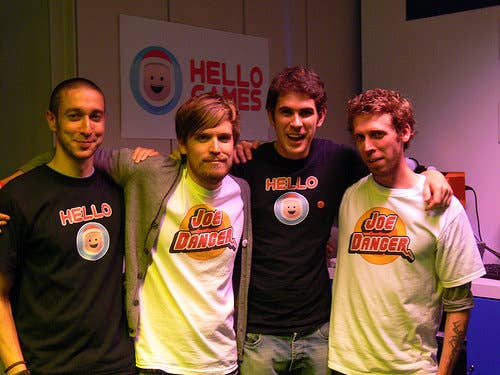You Had Me At Hello
Hello Games' Sean Murray on the teething pains of indie development, and how to love a project after six months
I think that we work in an amazing industry, in that the press, in particular - but gamers as well, approach game development as a completely level playing field. They don't care where a game came from. In fact, unlike movie-going audiences and the people who buy books, gamers and gaming press are almost inclined to play favourites and give a disproportionate advantage to little developers like us.
We don't want that to end! [laughs]
On the other side of the industry, in business terms... I'm not sure whether that applies. I think it's very interesting to me that someone like PopCap is being bought by EA for $750 million or whatever the final figure ends up being, whilst some of the most interesting games I see end up having to rely on kickstarter funding or loans from friends or whatever.
In most of those cases they're just looking for the sort of funding which just keeps them in beans on toast, they're not looking for crazy amounts of money. I find that very surprising from a business point of view, given that any one of those could be producing the next Plants Vs. Zombies or the next Peggle or whatever. Easily.
That happens all the time. New genres, exciting new games come from unexpected, at least from a business point of view, places. People seem totally taken aback when something like Minecraft comes out.
And the vast majority of those people would never have got funding, and they would have been looking for tiny amounts of funding. Especially considering the huge amounts which are being spent on developers who are arguably at their peak.
I think if I had a time machine and went back to Sean two years ago, and told him everything that was going to happen, he would have run a mile.
I think without the support of at least one of those outlets, the chances of success are reduced from tiny to almost non-existent. I think that if you talked to other indie developers, they might say, we've been turned down by Steam, or XBLA or PSN. It's a really common thing to hear, but it's also often a real finishing blow for any studio.
Often people are 100 per cent relying on it. Not just their approval process, but with someone like Apple you are 100 per cent reliant on them promoting your game. Without that, the service is nothing. It's the same for Steam, it's the same for XBLA, PSN, being on their services is only worth the amount of promotion that you're going to be blessed with.
I think they are also in complete control of that scene, in complete control of the output of indie developers. It's kind of a scary place, but I think we're certainly lucky to have them. If you look at the last generation, you couldn't make a PS2 game unless you were with a publisher and had a pretty sizeable team. There were no other options.
I would obviously definitely believe in collaboration. I definitely believe in working together with people, but... I think really good games, really great games, come from the heart of a very small core team always working 100 per cent focused. That is kind of where the magic happens. We always look to have, for our own team, everyone permanent and believe in their long-term development. That we'll all improve together and start to gel as a team.

That kind of means everything to us, that everyone is equally involved in the game. I think it's perfectly possible to get that with collaboration, just that little bit harder. I think that's why we haven't done that. I think in the trends that I've seen you see more success amongst developers who are not outsourcing a lot of work, that are working as a really tight team.
Part of that is just because they normally so small - if you have a two-man team and one of those is outsourced, it's crazy. It makes a lot less people when you're 300 people and some of those people are in Eastern Europe or somewhere. It's a much bigger problem when you're just two or three people.
I think if I had a time machine and went back to Sean two years ago, and told him everything that was going to happen, he would have run a mile! He wasn't prepared for it. I think it's good that I didn't know everything that was going to happen!
But if I could have visited him, at various stages of development, and told him - 'This is normal. You're not, necessarily, rubbish because your game doesn't look as good as you feel it should, or because you feel really constrained by having a really small group of people', or that 'it doesn't mean that you're an idiot because you've run out of money, those are just the harsh realities of the world'.
That would have been the really helpful advice. Just reassurance. There's nothing more reassuring than hearing from somebody who has had success. Who has made it through a problem. That they were where you are right now.
I think that's the most helpful thing that indies can talk about. I don't want to de-romanticise it or anything, but I think it is important to tell people that, if you are going to cut your ear off, it's really bloody painful.








